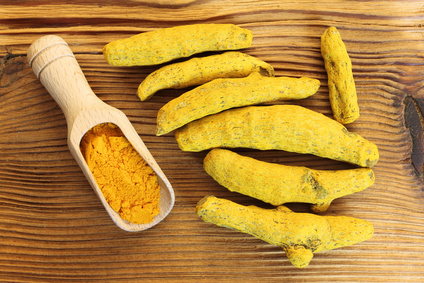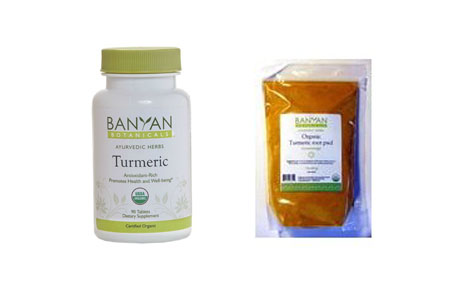Banyan Botanicals' Turmeric



T. Colin Campbell has made a career of challenging the conventional wisdom around nutrition, and this book is the culmination of his work. His integrity, brilliance, and unflinching courage shine through every page. "The China Study" takes a macro, bird's eye view of what we eat. The book is part intellectual biography, part nutrition guide, and part expose. As Campbell writes, "This is the story of how food can change our lives." Indeed it is.
Attached is an interesting study regarding "Astaxanthin" in the neuro protection of retinal cells (which could have implications for glaucoma). This was forwarded to me by a fiteyes member. A little research shows that there are some micro algae based supplements for obtaining this - In light of modern toxins, I am a little hesitant with consuming the amount of seafood that is probably necessary for getting this naturally in the diet.
Curcumin has been implicated in the treatment of certain eye diseases and conditions, including chronic anterior uveitis, an inflammatory condition of the vascular layer, particularly the iris. Read about a study that suggests that curcumin may be an effective therapeutic for a variety of inflammatory eye conditions.
I've been performing systematic self-tonometry as well as taking regular blood pressure readings for four months now. As Dave predicted I would, I've made several personal discoveries by simply gathering data and letting the findings rise to the top.
 As one individual, my IOP is significantly influenced by environmental factors, particularly diet. This has been frustrating because it is all a matter of trial and error, although I have been able to short-cut the process somewhat by reading about the restricted diets of migraine sufferers and the like. In my case, free glutamates (MSG in all its various and sundry forms, in particular) will always spike my IOP by as much as 6 points. It takes about three hours after ingestion for the effect to register which then, unfortunately, lasts for some time. The same holds true when I eat foods that throw off histamines or tyramines. Both of these biogenic amines are derived from amino acids and produced by foods that are highly processed, fermented, aged, marinated, slow-cooked, or, even slightly, spoiled. Needless to say, when I go to bed with high pressures as a result of making a "mistake" at dinner, I pay for it with higher than normal IOP that night and into the next morning. My working motto when it comes to food now is: "Plain is good; fresh is best." Sometimes that's easier said than done...try eating sushi without soy sauce.
As one individual, my IOP is significantly influenced by environmental factors, particularly diet. This has been frustrating because it is all a matter of trial and error, although I have been able to short-cut the process somewhat by reading about the restricted diets of migraine sufferers and the like. In my case, free glutamates (MSG in all its various and sundry forms, in particular) will always spike my IOP by as much as 6 points. It takes about three hours after ingestion for the effect to register which then, unfortunately, lasts for some time. The same holds true when I eat foods that throw off histamines or tyramines. Both of these biogenic amines are derived from amino acids and produced by foods that are highly processed, fermented, aged, marinated, slow-cooked, or, even slightly, spoiled. Needless to say, when I go to bed with high pressures as a result of making a "mistake" at dinner, I pay for it with higher than normal IOP that night and into the next morning. My working motto when it comes to food now is: "Plain is good; fresh is best." Sometimes that's easier said than done...try eating sushi without soy sauce.
My dietary effect is consistent enough that I can predict it in advance or almost always find the missing link when I look back at ingredients I consumed or take note of the way the food was prepared.
Curious to know if anyone has consistently experienced what I have with relation to dietary amines (particularly histamine and tyramine) and/or free glutamates: namely, a marked increase in IOP approximately three hours after eating foods with these properties.
EDIT: see the follow up here: Effect of Diet and Other Environmental Factors on IOP
Read the summary of University of Melbourne's Department of Optometry and Vision Sciences study on an association between dietary omega-3 fatty acid intake, age, and intraocular pressure. Another proof of beneficial effect of taking fish oil to strengthen and support healthy eyes and vision.
For dry eyes, here are some things to consider:

Consume more Omega-3 fatty acids (and less Omega-6 fatty acids). Ideally the ratio between these two types of fatty acids in your diet should be around 1:1. In the typical western diet, people consume 20 times more Omega-6 fatty acids.The Omega-3 fatty acids can decrease the viscosity of tears and normalize the function of the tear glands. Sources of Omega-3 fatty acid in your diet include walnuts and soybeans.
Please see the article featuring a research and study confirming that consuming a diet with higher levels of omega-3 fatty acids, antioxidants and low glycemic-index foods may delay compromised vision due to AMD.
Excerpted by permission from "Declare Your Independence" by Joel Salatin, part of the book Food, Inc., available now from PublicAffairs. Copyright 2009.